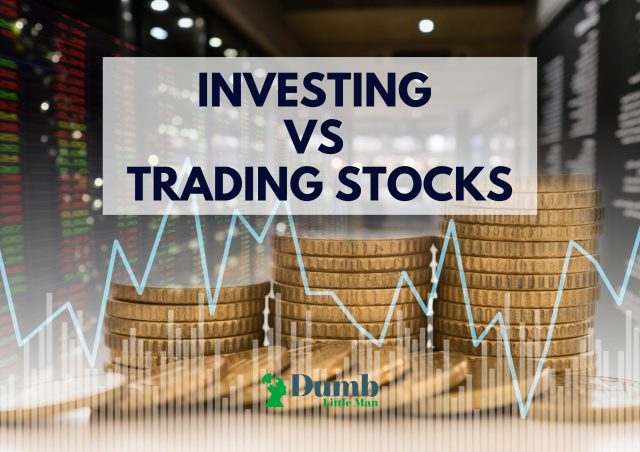Investing vs Trading Stocks: What Is The Difference?
By Jordan Blake
January 10, 2024 • Fact checked by Dumb Little Man

Want to jump straight to the answer? The best Stock Brokers are Tradestation and Tradier
The #1 Stocks and Forex Trading Course is Asia Forex Mentor
In the world of finance, trading and investment are the most common terms which are used. Sometimes the two terms are also used interchangeably. Even though trading and investment are related to each other, nonetheless, both these terms have different connotations in the financial markets. Hence, those who are confused about whether to put their capital into trading or investing need to understand both these processes entirely.
Individuals who want to earn through financial instruments and seek investment advice need to clearly understand the role of a trader and investor. Moreover, it is also crucial to learn about the major differences between investing and trading, so that one can determine the better option for themselves.
As a result, this review is intended to help readers in comprehending the basic function of trading and investment. Furthermore, the review aims to assist the individuals in finding out the key differences between trading and investing so that they could make competent financial decisions for themselves accordingly.
Investing vs Trading Stocks – What is the Difference

The basic definition of trading is that trading is a discretionary interchange of goods and services among various economic agents or participants. Similarly, the trading of financial instruments involves buying and selling securities, commodities, and derivatives.
These instruments can include stocks, mutual funds, exchange-traded fund EFT, index funds, real estate, and other securities. Moreover, another condition of trading is that the trading exchange only takes place when both parties consent to the voluntary exchange of goods and it is profitable for both traders.
As opposed to trading, investing in financial instruments is aimed at making revenue or appreciation. Appreciation is when the value of an asset increase over time. Consequently, investing is all about buying assets and keeping them on hold for an extended period until there is an opportunity for appreciation or high return.
The major difference between trading and investing is that the former is a short-term activity whereas investment is for long-term investors. As far trading is concerned, it is related to buying and selling assets considering the present market volatility to gain high returns. In contrast, investing is a long-term process of owning securities while they appreciate value over time.
Moreover, the very nature of both the proceedings is different from each other. Investment is a bit restrained, requires purposeful decisions based on a calculated understanding of a business’s essentials, and involves plenty of patience to wait for the perfect time and price. Trading, on the other hand, is more of a spontaneous activity where traders are ready to grab any opportunity that comes their way to earn profits. Traders are more concerned with the momentum and market trends rather than o business fundamentals.
How Investing Works

Investing involves buying asset classes in the hopes of earning some price appreciation in the future. An investor's portfolio consists of assets that are bought using capital today to earn a higher price over time. Moreover, the investor has multiple options to choose from while investing in any instrument such as bonds, stocks, real estate property, or a business, among other examples.
The first step before an investment decision is important to make a fundamental analysis of a company’s financial standing, prospects, management, and other key data to determine its fitness as an investment. Successful investors not only look at the past performance of various investment prospects but also anticipate future opportunities. Hence, Investing in financial instruments is all about making a well-informed and careful decision to accomplish long-term financial goals.
Next after careful fundamental analysis, is making an effective investment strategy. No matter whether the investment goal is growth, income, or increased value of the assets, the strategy should outline specifications for the appropriate time to buy and sell shares of stock. After drafting the outline of the investment strategy the next goal is to achieve diversification and asset allocation of the investment portfolio.
A diversified portfolio increased the chances of earning higher returns and also helps in covering losses. However, diversifying through individual stocks in multiple companies can be costly and inconvenient for any investor. As a result, competent asset allocation in different classes such as equities or fixed-income investments is also a requisite for successful investment. Hence, one cannot diversify their portfolios while not making any efforts in appropriate asset allocations.
Pros and Cons of Long-Term Stock Investing
Pros
- Wealth creation
- Ownership
- Source of income
- low-risk tolerance
Cons
- Requires time and research
- The pace of growth is slower
How Trading Works

Trading involves the consensual exchange of goods or services between two parties to earn profits. Specifically, in finance, trading is done involving multiple financial assets including stocks, exchange-traded funds (ETFs), mutual funds, index funds, and other financial instruments. Thus, the ultimate goal of traders is to earn maximum profits. Nonetheless, with substantial returns comes greater risks as well.
Traders are generally divided into two types, swing traders and day traders. Swing trading involves buying and selling stocks when the stock market is fluctuating regularly. They keep getting in and out of the process according to the market trends. In comparison, day trading usually requires holding of assets for a single trading session and not more. There is also another type which is the general stock traders. these traders only hold their position for no longer than days or weeks.
Much like investing, trading also requires traders to design a competent strategy to achieve their goals. For successful trading, a plan is needed to assist traders in deciding on choosing the right time to buy and sell stocks. Once a strategy is made, the trader can then use certain tools like stock screeners to locate the opportunities in the market according to their set criteria.
As soon as a trader identifies a trading opportunity, the next task is to wait for the right stock price by exploiting the volatility of the market. This process of following the price fluctuations on the stock charts is called the technical analysis. For experienced traders, technical analysis is easier to conduct as they are familiar with the market trends. However, for newbies, it is a tough nut to crack.
The technique of technical analysis is an important step for experienced traders who are familiar with the inner workings of the stock market. Even after using various techniques and strategies, trading is nevertheless a risky business where there are chances for both potential for both massive returns and devastating losses.
Pros and Cons of Long-Term Stock Trading
Pros
- Capital growth
- Short-term process
- Full-time business
- Low-cost startup
Cons
- High potential risk
- No guaranteed return
Investing vs Trading Stocks – Which is Better for you

When it comes to comparing trading and investing, active trading is relatively the more enticing option of the two for opportunity seekers. Unlike investing, trading does not involve a long and planned procedure to earn money. Instead, traders are always ready and seeking the ideal time for buying stocks, earning profits, and selling stocks at the right time.
Opposite to investing, trading involves chances of getting higher returns however, with more money comes greater risks. As trading is associated with substantial profits it is equally vulnerable to potential risks which mean in case of market volatility the losses could also be massive. Consequently, trading is the best option for those who want to earn quick money and are willing to face the potential risks.
Active investing, on the other hand, is for people who want to go slow and steady. Investors generally involve long-term planning and have a strategic orientation. Investors firstly analyze themselves and then make a strategy accordingly before making any investing decisions. Moreover, investing in assets usually does not result in very high capital gains, however, successful investing ensures fixed incomes and growth in the overall wealth of the investors.
Another advantage of investing is its low-risk tolerance. Since successful investing is all about diversification and efficient asset allocation. This helps investors to be saved from many potential losses. Consequently, investing is a better option for those who are not very comfortable with risk and are not looking for the highest level of capital gains.
Featured Investing Broker of 2024
| Broker | Best For | More Details |
|---|---|---|
 | Advanced Non US Traders Read Review | securely through Avatrade website |
 | Intermediate Non-US Traders Read Review | securely through FXCC website |
Overall Broker | securely through Forex.com website | |
 | Professional Forex Traders Read Review | securely through Interactive Brokers website |
| Broker | Best For | More Details |
|---|---|---|
 | Advanced Traders Read Review | securely through Tradestation website |
 | Intuitive Platforms Read Review | securely through Tradier website |
 | Powerful Services at a Low Cost | securely through Tradezero website |
 | Professional Forex Traders Read Review | securely through Interactive Brokers website |
Best Stock and Forex Training Course

Whether you are among the retail Traders or investing companies, anyone looking for promising success in the trading industry needs to opt for a competent forex training program. No matter which financial instrument want to deal in forex, stocks, indexes, commodities, crypto, gold, silver, etc. everyone needs proper training. Gaining massive profits in six figures is only possible by learning from the best forex training course.
The best forex course which is most effective is provided by Asia Forex Mentor. Through this amazing course, traders do not just make some profit, on the contrary, the pro-traders make massive profits making 6 figures per trade, with the help of financial experts, every time through their amazing strategy of mathematical probability.
This may sound unrealistic and impossible. However, there is no miracle or bragging here but the magic of mathematical probability through, the proprietary system of the one core program provided by the Asia Forex Mentor. The one core program is the recipe for ingenious trading results to humungous profits. All of this is possible due to the expert traders and trainers of the one core program who have designed strategies and know-how to edge out the market every time from basic to advanced level.
The developers of the Proprietary One Core Program are not just ordinary traders but are financial experts equipped with research-based trading strategies. These trainers have years of experience behind banks and successful trading institutions. As a result, these experts have come up with a comprehensive trading course ranging from beginner to advanced level.
Moreover, the One Core Program is not just a set of strategies to learn from but a complete trading solution with expert advice and tweaks and customized expert solutions for every individual client whether a beginner or an experienced trader. Hence, the AFM Proprietary One Core Program is the ultimate solution to all your trading needs
| RECOMMENDED TRADING COURSE | REVIEW | VISIT |
|---|---|---|
 | #1 Forex, Crypto and Stocks trading course. Ranked most comprehensive by Investopedia and Best by Benzinga. Free to Try! |  |
Conclusion: Investing vs Trading Stocks

Investing and trading are both activities related to the stock market, however, these are two different entities altogether. Investing is a long-term process that revolves around promising prospects to gain higher returns over time. Whereas trading is all about a spontaneous approach of seizing the opportunity by buying stocks and selling them with potential profits. Overall an investing process can take months or even years whereas trading can take place on daily basis.
Another primary difference between investing and trading stocks is the significant implications in terms of risk, reward, market knowledge required, and strategies used. Investing involves lower risk, the reward is comparatively lower as well, requires rigorous market research, and has a strong strategic orientation. Successful trading in contrast has higher risk, potential greater returns need basic market knowledge, and involves various strategies.
When it comes to opting between trading and investing it is crucial to have a clear understanding of both these processes. If a newcomer wants to dive into the stock market, it is important to test the waters beforehand. Trading might seem like an exciting opportunity due to its spontaneous process and instant approach. However, one needs to be aware of its potential risks.
Contrary to this, for those capitalists who are not looking for instant results and are willing to invest their capital, time, and efforts to gain low-risk returns, investing might be the right choice for them. Furthermore, investing also requires some experience in the stock market and familiarity with technical analysis and research skills. With all these capabilities one can surely opt for investing and can be successful.
Investing vs Trading Stocks FAQs
Is trading stocks and investing the same thing?
When it comes to the stock market, trading and finance are two different activities. Trading and investing are related to one another however the procedure of both these entities is very different from each other. As a result, it is very important to understand the very nature of trading as well as investing thoroughly before making any financial decisions.
As far as Investment is concerned it is a restrained activity. Investment is a time-bound process and requires purposeful decisions. These decisions should be based on a calculated understanding of a business’s fundamentals. Similarly, the act of investing involves plenty of patience to wait for the perfect time and price before taking any action.
Trading, on the other hand, is more of a spontaneous activity where traders are ready to grab any opportunity that comes their way to earn profits. Traders are more concerned with the momentum and market trends rather than business fundamentals.
All in all trading stocks and investing have two different mechanisms. Both these activities intend to earn profits and wealth creation however the process is different from each other. Hence, one needs to be well informed about both these processes so that an individual can choose the option which is better for them.
Is it better to trade or invest in stocks?
When it comes to opting between trading and investing it is crucial to have a clear understanding of both these processes. If a financial immature wants to enter the stock market, it is important to do thorough research beforehand. Hence, while choosing between the two it is important to analyze both the processes and choose the one which suits their personal preferences.
For some trading might seem like an exciting opportunity due to its spontaneous process and instant approach. However, one needs to be aware of its potential risks. Nevertheless, new individuals in the trading business might need to do some market research and technical analysis before diving into stock trading.
In contrast, for those who are not looking for instant results and are willing to invest their capital, time, and efforts to gain low-risk returns, investing might be the right choice for them. Furthermore, investing also requires some experience in the stock market and familiarity with technical analysis and research skills. With all these capabilities one can surely opt for investing and can be successful.
The most successful traders have a detailed understanding of how the market works and the technical indicators that help predict where the market is headed. Their experience in the market has led to a level of comfort with risk beginners just don’t tend to have. On the other hand, investing can be done successfully by anyone willing to take the time to research solid opportunities. As such, it’s a perfect vehicle for beginners to enter the market.
Jordan Blake
Jordan Blake is a cultural commentator and trending news writer with a flair for connecting viral moments to the bigger social picture. With a background in journalism and media studies, Jordan writes timely, thought-provoking content on everything from internet challenges and influencer scandals to viral activism and Gen Z trends. His tone is witty, observant, and sharp—cutting through the noise to bring readers the “why” behind the “what.” Jordan’s stories often go deeper than headlines, drawing links to pop culture, identity, and digital behavior. He’s contributed to online media hubs and social commentary blogs and occasionally moderates online panels on media literacy. When he’s not chasing the next big trend, Jordan is probably making memes or deep-diving into Reddit threads. He believes today’s trends are tomorrow’s cultural history—and loves helping readers make sense of it all.













